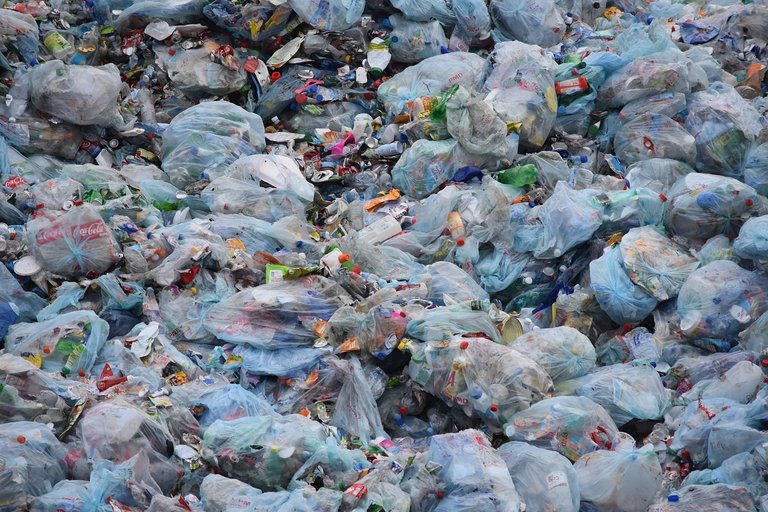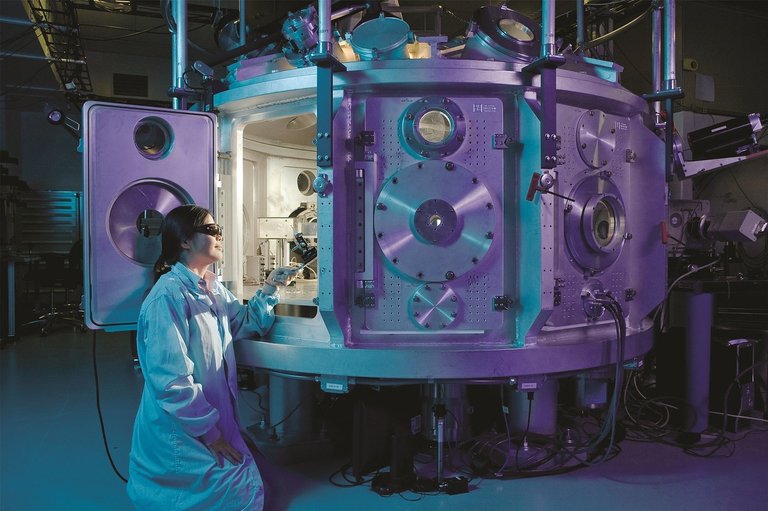Plastics are of different varieties with different properties, and unavoidably have great domestic and industrial applications. Using them for whatever reasons in our everyday activities are almost inevitable, making them not only ubiquitous but also among the most versatile and durable materials ever produced by man. The durability of plastics though are of benefits to man, but it also comes with a cost as disposed plastics constitutes health hazards on land and inside the water bodies.

[Source: Pixabay commons. CC0 licensed]
True, plastics are recyclable by means of industrial (artificial) treatment but this is grossly limited and hence inefficient owing to the expensive nature of such a recycling process. According to a report
by The Guardian, about 1milion plastic bottles are bought per minute around the world. And of this huge number, only about 14% are recycled while a larger chunk of the rest ends up in oceans, polluting aquatic ecosystem and harming marine life. A number of the pollutants eventually enter the food chain via marine organisms, and potentially harming humans who consume the marine organisms for food.
The journey to the accidental discovery of plastic-degrading super enzyme
The team of scientists who were involved in the accidental discovery of the super enzyme that has been adjudged to have a great potential to handle the world's plastic pollution crisis did not originally set out to embark on the study with an honest intention to arrive at the historic result. Prelude to this investigation was the work of a team of Japanese researchers, which was published in the Journal Science and in which they claimed to have discovered, for the first time, a bacterium Ideonella sakaiensis 201-F6 at a Japanese landfill that was found to have uncommon appetite for Polyethylene terephthalate, PET.

[Structure formula of polyethylene terephthalate. Source: Wikimedia commons. Author: Rohieb. CC BY-SA 3.0 licensed]
PET is a type of plastic used to make water and soda bottles, which contributes that largest chunk of pollutants in our environment. Before the finding of this plastic-eating bacterium, there are other biological agents that have been discovered to also degrade PET, among which includes cutinase enzyme from the mesophilic fungus Fusarium oxymosporum. However, none of the already known PET eaters would degrade PET as fast as the bacterium.
Further genetic examination of the bacteria showed that they may have evolved enzymes that are naturally tailored towards breaking down PET as an evolutionary mechanism to surviving long-term accumulation of plastics within the microbes' environment. The enzymes were subsequently dubbed PETases.
Plastic is widely known to be stubbornly resistant to natural degradation and so the discovery of plastic-eating bacteria by Japanese researchers was globally praised by scholars and experts as being capable of providing a natural solution to plastic pollution.
The accidental discovery
The work of Japanese researchers attracted global scientific interests in the structure of the PETase enzymes. And in a new research that was published in the journal Proceedings of the National Academy of Sciences, a team of researchers from the University of Portsmouth employed Diamond Light Source to determine the precise structure of the enzyme from the plastic-eating bacterium that was discovered in Japan. In the course of this study, the researchers found the structure of PETase enzyme to be similar to the enzyme many bacteria are fond of using to break down a different but plastic-like chemical known as cutin. Cutin is an external, protective coating produced by plants. Owing to the obvious similarities between plastic and cutin, researchers hypothesized that the newly found PETase enzyme must have evolved from the older enzyme that is active against cutin.

[Source: Pixabay commons. CC0 licensed]
In trying to establish the veracity of this hypothesis, the researchers tweaked the part of the structure of the PETase enzyme thought to be central in its ability to degrade plastic to see how it had evolved but ended up creating an entirely new mutant enzyme, instead. The newly created mutant enzyme was found to be 20 percent faster at breaking down PET than the original enzyme from the bacterium that was discovered by Japanese researchers on 2016.
Commenting on the accidental discovery, Professor John McGeehan who was led the researcher, said:
“It is a modest improvement, but that is not the point. It’s incredible because it tells us that the enzyme is not yet optimised.” Source
Conclusion
The accidental discovery of mutant enzyme that is even more effective in degrading plastics than the original enzyme extracted from plastic-eating bacteria, have opened up whole new vistas for further manipulation of the existing enzyme mutant until we have something that will be used for large scale recycling processes. Researchers are already working on this, and are very optimistic that this will prove to become a more viable and sustainable alternative to large-scale plastic recycling processes very soon. Thanks for reading.
References for further reading
- Could a new plastic eating bacteria help combat this pollution scourge?
- A bacterium that degrades and assimilates poly(ethylene terephthalate)
- Characterization and engineering of a plastic-aromatic polyesterase
- Plastic-eating enzyme accidentally created by scientists could help solve pollution crisis
- Scientists accidentally create mutant enzyme that eats plastic bottles
- Researchers Accidentally Find Enzyme to Break Down Plastic
Yours truly,
@eurogee
Do You Blog About Science, Technology, Engineering, and Mathematics? If Yes, Patiently Read The Below Info


Join Euronation Community on Telegram and whatsapp through the below links to socialize with larger steemit community:

No Witnesses = No Steem Blockchain; If You Truly Love Here, Vote For Witnesses NOW!
Click This Link To Vote Now


Non-biodegradable substances have been a thorn to remediation efforts
Thank God for this research outcome
Kudos to the scientists
Thanks for sharing
Thanks. I am happy you like my work
Hello my friend, why I can't join to WhatsApp group your share?
Sorry. Perhaps other admins had revoked it. Pm me on discord.
Ok.
I am PM you in telegram
We need this in Nigeria
If you know what I mean... Most especially in Lagos.... Good work boss
Not only Lagos. Everywhere! ✌️
Nicely written boss... Thought you had left us to science but now, I think you were just too busy to keep up then...
Plastics are very wonderful materials that also have their bad sides which is a normal thing. The plastic eating enzyme is something new to me though but it's a nice idea anyway..
:thumbsup
Exactly my brother. Steemstem posts not something you can just close eyes and write. You need to read many resources and lots of citations. So I had to take a brief break and focus on other offline interests. But am back now for real. And thanks for visiting my blog.
@eurogee
It's my duty... Lol
I hope this will push through, our country needs a lot of this bacteria....
Have a great day sir @eurogee 😘😘😘